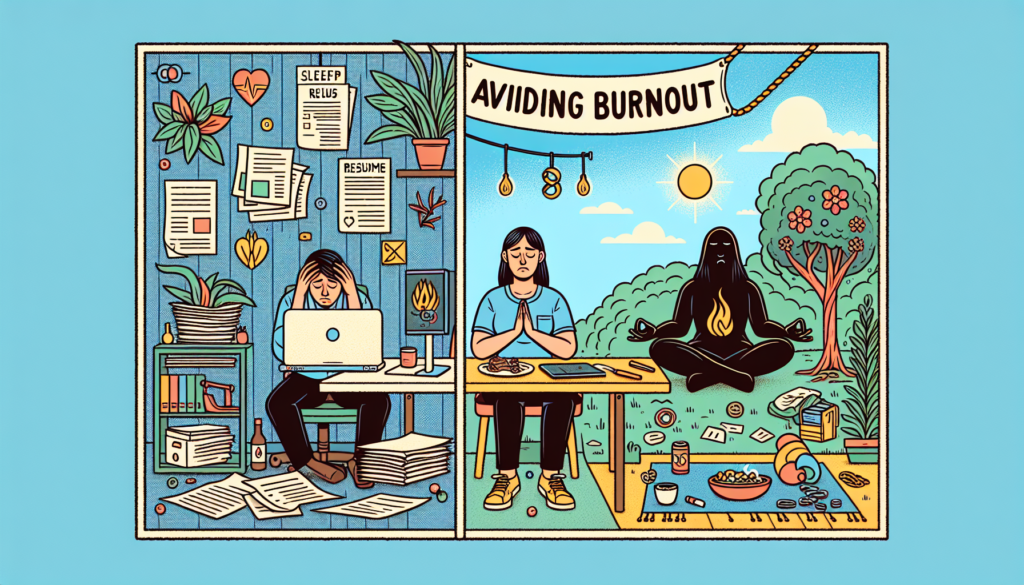Avoiding Burnout: Essential Self-Care Strategies for Job Seekers in 2024
Meta: Discover effective self-care strategies to prevent burnout during your job search. Learn practical tips for maintaining mental health and staying motivated while seeking employment.
Did you know that 77% of job seekers report experiencing burnout during their search? I’ve been there, and let me tell you – the constant cycle of applications, interviews, and waiting can be overwhelming! But here’s the good news: implementing the right self-care strategies can make all the difference in maintaining your mental health and motivation during this challenging journey. Let’s explore how to keep your spirit high and your energy balanced while pursuing your career goals!

Understanding Job Search Burnout
Job search burnout is a real struggle that many people face, and it’s important to recognize the signs early. You might notice yourself feeling increasingly frustrated, anxious, or even apathetic about your job search. These are classic symptoms of job search fatigue.
Common triggers can include constant rejection, lack of feedback, or feeling like you’re not making progress. It’s not just your mind that suffers – your physical health can take a hit too. You might experience changes in sleep patterns, appetite, or even develop headaches.
Here’s the thing: traditional advice like “just keep pushing” or “stay positive” often falls short. Why? Because it doesn’t address the root causes of burnout or provide practical solutions for managing the emotional toll of a prolonged job search.
Creating a Sustainable Job Search Routine
To combat burnout, it’s crucial to develop a sustainable routine. Start by setting realistic daily goals. Instead of saying “I’ll apply to 20 jobs today,” try “I’ll spend two hours on job applications.”
Time-blocking can be a game-changer. Dedicate specific hours to job searching, and stick to them. This helps create structure and prevents the search from consuming your entire day.
Don’t forget to establish boundaries. It’s okay to take time off from your job search – in fact, it’s necessary for your well-being.
Regular breaks are essential. Try the Pomodoro Technique: work for 25 minutes, then take a 5-minute break. After four cycles, take a longer break.
Lastly, practice digital wellness. Turn off job alerts outside of your designated search time, and limit social media use that might trigger comparison or anxiety.
Physical Self-Care During the Job Hunt
Physical self-care is often overlooked, but it’s crucial for maintaining energy and motivation. Exercise is a great way to manage stress and boost mood. Even a 20-minute walk can make a difference.
Sleep hygiene is key. Try to maintain a consistent sleep schedule, and create a relaxing bedtime routine. Avoid screens for at least an hour before bed.
Don’t underestimate the power of good nutrition. Fuel your body with balanced meals and stay hydrated. It’s tempting to rely on caffeine and sugar for quick energy boosts, but these can lead to crashes later.
If you’re spending a lot of time at your desk, incorporate regular stretches and desk exercises. Stand up and move around every hour.
Finally, make time for outdoor activities. Fresh air and nature can do wonders for mental clarity and overall well-being.
Mental Health Maintenance Strategies
Taking care of your mental health is crucial during a job search. Mindfulness and meditation can help reduce stress and improve focus. Even just five minutes of deep breathing can make a difference.
Journaling is another powerful tool. Write about your experiences, frustrations, and successes. This can help process emotions and gain perspective.
Positive affirmations might feel cheesy, but they can help counteract negative self-talk. Try starting your day with a few encouraging statements.
Stress management techniques like progressive muscle relaxation or guided imagery can help when you’re feeling overwhelmed.
Don’t hesitate to seek professional support if you’re struggling. Many therapists offer sliding scale fees or online options that can be more accessible.
Building a Support Network
Remember, you’re not alone in this journey. Connecting with fellow job seekers can provide valuable support and insights. Look for local job search groups or online forums.
Career counselors can offer professional guidance and help you refine your strategy. Many offer free initial consultations.
Don’t underestimate the importance of family and friend support. Let your loved ones know how they can help, whether it’s through emotional support or practical assistance.
Online communities can be a great resource for industry-specific advice and networking opportunities. Just be mindful of maintaining a healthy balance with your online engagement.
Speaking of networking, it doesn’t have to be exhausting. Focus on quality over quantity, and look for ways to genuinely connect with people rather than just asking for job leads.
Balancing Productivity and Personal Time
It’s easy to let your job search take over your life, but maintaining balance is crucial for long-term success. Create work-free zones in your home and set specific times when you won’t engage in job search activities.
Integrate hobbies into your routine. Whether it’s reading, painting, or playing an instrument, engaging in activities you enjoy can help reduce stress and maintain a sense of identity beyond your job search.
Don’t neglect your social life. Spending time with friends and family can provide a much-needed break and emotional support.
Relaxation techniques like deep breathing, progressive muscle relaxation, or even a warm bath can help you unwind after a day of job searching.
Finally, implement weekend reset practices. Use your weekends to recharge, catch up on self-care, and prepare for the week ahead. This might include meal prep, light exercise, or simply enjoying leisure activities.

Conclusion
Remember, taking care of yourself isn’t just a luxury – it’s a crucial part of a successful job search! Implement these strategies gradually, and don’t forget to celebrate small wins along the way. Your dream job awaits, but maintaining your wellbeing should always be the top priority.




